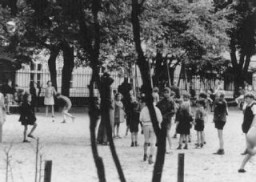You searched for: Deportation jews from germany to poland
<< Previous | Displaying results 101-110 of 263 for "Deportation jews from germany to poland" | Next >>
-
Fela Perznianko
ID CardFela was the older of two children born to Jewish parents living in Zakroczym, a town on the Vistula River near Warsaw. Her father was a respected attorney. As a young woman, Fela worked as a hat designer in Warsaw, until she married Moshe Galek when she was in her late 20s. She moved to the nearby town of Sochocin, where her husband owned a pearl-button factory. Fela and Moshe raised four daughters. 1933-39: In 1936 the Galeks moved to Warsaw, attracted by the city's cultural life. When Germany invaded…
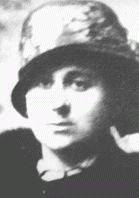
-
Max Rosenblat
ID CardMax's parents, Taube and Itzik, first met as children in 1925. Taube was the daughter of a tailor who hired apprentices in his shop, and Itzik was one such apprentice. The Jewish youngsters fell in love and dreamed of getting married even though Taube's family frowned upon the match. 1933-39: In 1938 Taube and Itzik married. The couple lived in an apartment on 49 Zeromskiego Street in Radom, where Itzik opened a women's tailor shop. Max was born in July 1939. He had curly hair and blue eyes like his…
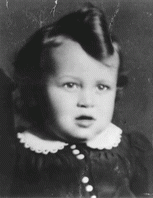
-
Josef Litwak
ID CardThe son of Moses and Sarah Litwak, Josef was born in Dolina, a town in southeastern Poland. Josef came from a religious Jewish family. When he was in his early twenties, he married Mina Schaerf from the nearby town of Vinnitsa just across the Polish border. The couple settled in the industrial city of Lvov, where Josef worked in the family-owned bank. Josef and Mina raised five children. 1933-39: The Litwaks' two youngest children, Fryda and Adela, had finished secondary school and were planning to attend…
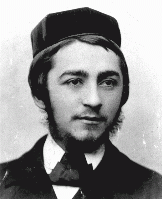
-
Kazimiera Banach Justynowa
ID CardKazimiera was born to Roman Catholic parents in the town of Mierzen. After graduating from a teacher's college in Staniatki, she married Wincenty Justyna, a secondary school teacher. The couple settled in the small industrial city of Piotrkow Trybunalski and raised three children, Jerzy (a boy), Danuta and Maria. Kazimiera worked as a school teacher. 1933-39: With their combined incomes the Justynas were able to buy a plot of land and build a house. The Germans invaded Poland on September 1, 1939, and…
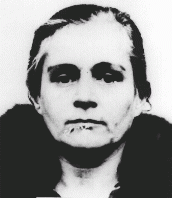
-
Dosia Szabszevicz
ID CardDosia, her older sister and parents lived on her grandfather's estate in the town of Ozorkow, eight miles from Lodz. Dosia's parents were secular Jews. They spoke both Polish and Yiddish to each other, but only Polish to their children. Dosia's father worked as an accountant, and her mother was active in organizing charity events for several of Ozorkow's Jewish organizations. 1933-39: A few days after Germany invaded Poland in 1939, Dosia saw the Polish army retreat through Ozorkow, carrying their wounded…
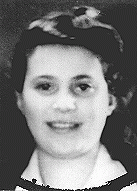
-
Berlin
ArticleBerlin was home to Germany’s largest Jewish community. It was also the capital of the Third Reich and the center for the planning of the "Final Solution."
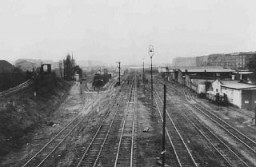
-
1939: Key Dates
ArticleExplore a timeline of key events during 1939 in the history of Nazi Germany, World War II, and the Holocaust.
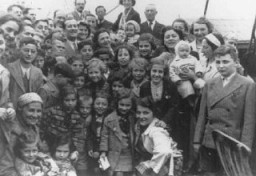
-
The Holocaust in Bohemia and Moravia
ArticleLearn about the Holocaust in the Protectorate of Bohemia and Moravia, including deportations to and from the Theresienstadt camp-ghetto.
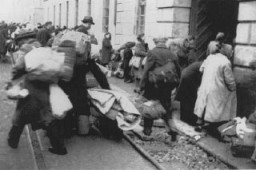
-
Władysław Bartoszewski discusses Żegota
Oral HistoryWładysław Bartoszewski (1922–2015) was a co-founder and member of the Council for Aid to Jews, codenamed “Żegota.” Żegota was a clandestine rescue organization of Poles and Jews in German-occupied Poland. Supported by the Polish government-in-exile, Żegota coordinated efforts to save Jews from Nazi persecution and murder. It operated from 1942 to 1945. After World War II broke out in 1939, Władysław worked as a janitor at a Polish Red Cross clinic. In the fall of 1940, Władysław was caught…
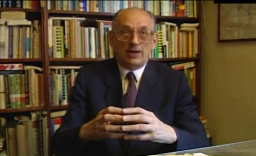
-
Deceiving the Public
ArticleThe Nazis frequently used propaganda to disguise their political aims and deceive the German and international public. Learn more.
